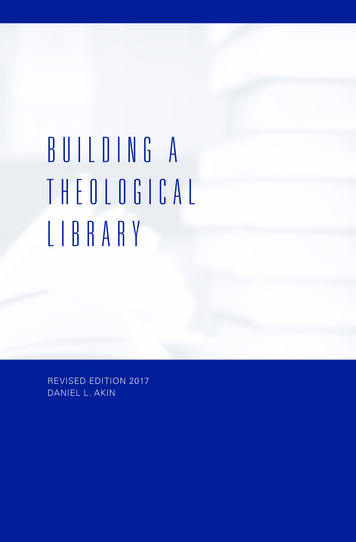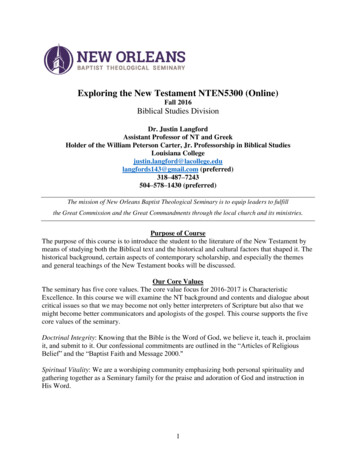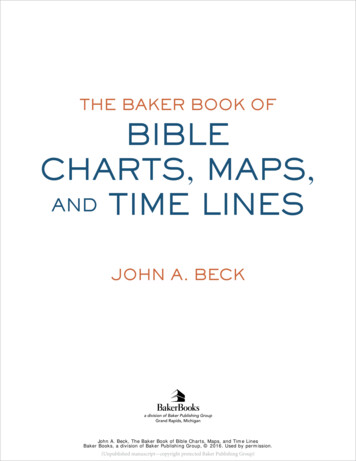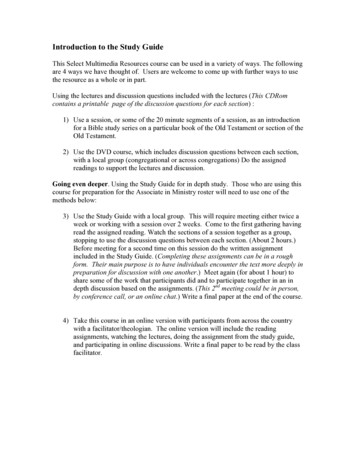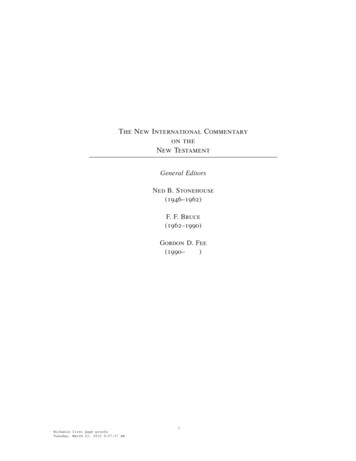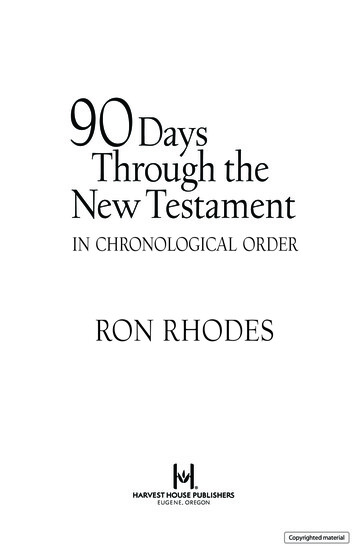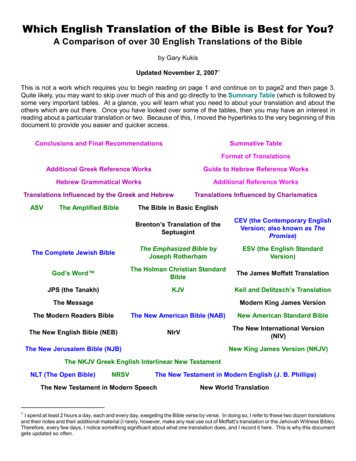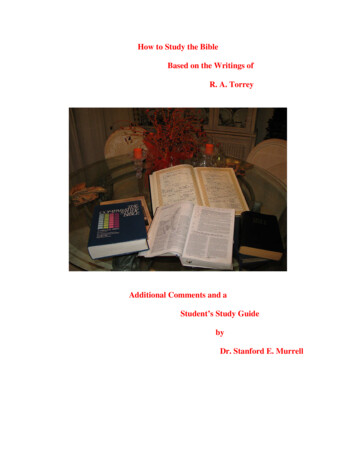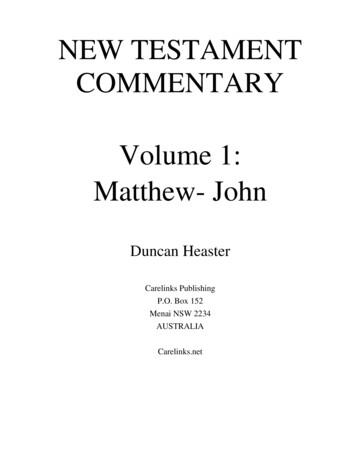
Transcription
NEW TESTAMENTCOMMENTARYVolume 1:Matthew- JohnDuncan HeasterCarelinks PublishingP.O. Box 152Menai NSW 2234AUSTRALIACarelinks.net
PrefaceI‟ve been writing about the Bible for over 25 years. Whilst my basic doctrinal convictions haven‟tchanged in that period, my views on many other things have matured. Problem is, I write as a wayof thinking, indeed I still have the exercise books of original notes written in my time in CentralAfrica which became my first published books. With the advent of notebook computers, I ended uptapping everything out rather than writing it up And as I read and processed more material, inboth volume and breadth, I added in what I‟d picked up. What this means is that if you scourthrough my material, you can find many contradictions, differing viewpoints and approaches beingsuggested by the same author. I‟ve never really been bothered to regularly purge my material I‟velet it stand. I‟m not ashamed or worried by the changes and developments, it‟s normal and natural.Anyone who uses this commentary in any depth will soon discern that this is no uniformpresentation. It‟s one man chatting to himself over the years, and to you, about God‟s word. I see itall as a sowing of seed rather than a dogmatic presentation of final Truth- a stimulation of yourmind, your own Biblical research, your searching for the God and Son of God who are “in all theScriptures”.Some of the material was published as hard copy books, and all of it can be found online on theAletheia Bible College website [aletheiacollege.net/heaster.htm]. I‟d always been against the verseby-verse approach to Bible study, as it seemed to result in potted thinking and simplistic dogmatismby those who swallowed it. I preferred thematic study rather than verse by verse. But as I settleddown in life and began running a church in Riga, Latvia, I found myself almost daily being asked[in essence]: “Please explain the Bible to me this chapter that book and what does thispassage mean?”. Running several public meetings per week, I saw the advantage of simply readingthe Bible together systematically, and then explaining the chapter read to the folks and consideringtheir questions. So I found myself talking chapter by chapter, if not verse by verse; and needing toprepare material on specific Bible chapters ahead of time. Everything I‟ve written on Scripture isonline and searchable, and I‟ve tried to use the same abbreviations for books of the Bible allthrough. So naturally I found myself hitting the search key rather often late on Saturday nights. Butit has became useful and convenient for me to reassemble the material in my books and articles intoa form which corresponded to Bible chapters and verses. So I went through the material and cut andpasted the material on specific Bible verses into a Biblically chronological sequence. And out camethis commentary. And hence the rather disjointed nature of some of the comments as they stand. Butlet me repeat the caveat about any verse-by-verse approach- there is not just one lesson to be learntfrom each Bible verse, there‟s the real possibility that the explanation you read is wrong orincomplete or skewed in some way.The personal background given above will explain why the „level‟ and nature of the commentaryvaries. Some of it‟s high theology; other parts are simple encouraging remarks on a few words ofScripture, initially prepared for the illiterate or barely literate. For the most part I‟ve removedtheological and academic references and similar footnotes; but if you want to get into a commentfurther or find the academic support for a historical or factual statement, you can look up the phraseon the CD or use the search facility at aletheiacollege.net/heaster.htm . Then you‟ll see thecommentary in its original setting, with academic apparatus. If you want to engage with me overanything written- don‟t be shy. You can reach me via the publishers or through dh [at] heaster.org.May God‟s word become flesh in us as it was in the Lord Jesus. May we rejoice in His word as onewho finds great riches. May it be sweeter than honey, needed and valued by us more than our dailyfood; may we live not by bread alone, but by every word of God. May the word of Christ dwell inus richly. May it be seed for us, bread in our wilderness, until we reach the promised land.Duncan Heaster2Riga, Latvia, 1st December 2010
MATTHEW1:1 the book – a reference to the entire Gospel, or to the genealogy which follows?generation- Gk. „nature‟ (s.w. James 1:23; 3:6). If “the book” refers to the entire Gospel, this couldbe read as implying that Matthew wished to develop the theme of the nature of the Lord JesusChrist; hence he begins by showing His human roots through the genealogy Matthew presents.Matthew begins his presentation of the Gospel with the claim that Jesus is the promised Sonpromised to David and Abraham, thereby fulfilling the promises made to them about the futureSaviour. Negatively, we could say that the Gospel begins with a denial that Jesus personally preexisted, and with an emphasis upon His humanity.1:2 The Abraham-Isaac-Jacob family is unusual, in that most of the other „sons of‟ in Matthew‟sgenealogy refer to grandsons or great-grandsons- see on Mt. 1:4. Clearly this was a father-songrandson family situation which all played a significant part in God‟s purpose.1:3 Why the mention of Zara? Maybe because he was the firstborn, but God delights to workthrough the weak, the 2nd best, the underdogs; those who are not the firstborn. Likewise thisexplains the mention of the fact that a woman who acted as a prostitute, Tamar, was in the line ofJesus. We cannot blame our sin and failure on a poor spiritual background for Jesus hadprostitutes, questionable people, murderers etc. as His ancestors, and yet achieved perfection.1:4 Naason was prince of the tribe of Judah in the time of Moses (Num. 1:7; 2:3; 7:12). Fourgenerations are given by Matthew‟s genealogy, but it covered at least 470 years from Israel being inEgypt, walking through the wilderness, and entering the land. It‟s clear that some generations areomitted- because he wished to present as fourteen generations from Abraham to David (Mt. 1:17).1:5 Matthew‟s genealogy features [unusually, for Jewish genealogies] several women, who hadbecome the ancestors of Messiah through unusual relationships. It‟s almost as if the genealogy isthere in the form that it is to pave the way for the account of Mary‟s conception of Jesus without aman.Rahab the Gentile prostitute married a prince of the tribe of Judah, Salmon. Was he one of the spieswho stayed with her? It was the tribes of Judah and Ephraim whose spies had been faithful the firsttime Israel approached Canaan, so perhaps the two spies who were sent to Jericho were the princesof those tribes?Boaz married Ruth to raise up seed unto the childless Mahlon (Ruth 4:10 cp. Dt. 25:5,6). But theletter of that law is put aside here- to develop the point that Jesus really is descended from a bunchincluding murderers, Gentiles, women, whores and gamblers.1:6 Gk. The David, the King. This may be in order to set up a juxtaposition between the fact Davidwas the King, and the fact that David although the great King of Israel, had an affair with “her thathad been the wife of Urias”. Again, the genealogy would be highlighting the spiritually weak, sohuman, ancestry of the Lord Jesus. However the definite article occurs again in 1:16, the Joseph. Itmay be a way of marking off the central and finishing point of the genealogy as intended by 1:17.1:8 Ahaziah, Jehoash and Amaziah are excluded by the statement that “Jehoram begat Uzziah”because they were all descended also from Athaliah and Jezebel, whose name God so wished to blotout?1:12 Jeconiah was to be written childless (Jer. 22:30)- but God‟s sensitivity to human repentance iseven greater than His insistence upon fulfilling His word, and so it seems to me He rejoices to letthis apparent contradiction stand for all time. If the Bible were a forgery, such a bloomer of acontradiction just wouldn‟t have been made. Instead, we find in this „contradiction‟ an insight intothe depth of God‟s grace and eagerness to accept human repentance.3
1:14,15 The names mentioned here are the ones we have least information about throughout theentire genealogy.1:16 Lk. 3:27 describes Zerubbabel as the head / chief / leader. The term Rhesa is incorrectlyrendered in many versions as a name. Perhaps Luke‟s point was that the Lord Jesus was the finalMessiah, after the failure of so many potential ones beforehand. „Zerubbabel the chief‟ would thenbe a similar rubric to “David the king” in Matthew‟s genealogy (Mt. 1:16).Joseph was therefore directly in the Kingly line- he should‟ve been King, by descent. And yet heappears to have fallen upon hard times, given the information we have surrounding the babyhood ofJesus. A faithful yet depressed „man born to be king‟ who hadn‟t made it in life, whose family hadfallen a long way, at least in his own eyes, was the very one whom God chose to work with.1:17 Mt.1:17 mentions that there were 42 generations before Christ. This must have someconnection with the 42 stopping places before Israel reached Canaan, as described in Num.33:2.Thus the birth of Christ would be like God's people entering the promised land of the Kingdom insome way. Note too that the numerical value of „David‟ is 14. And yet the third „14‟ is only 13names- because the ultimate completion of the Christ story is in the bringing forth of Christ‟s seed,i.e. His body, the glorified church (Is. 53:10)?1:18 - see on Lk. 2:19.1:19 The righteousness and justice of Joseph is shown by his choosing not to make his pregnantfiancée an example, but to save her from the humiliation of her apparent sin. He may well havesensed, of course, that the pregnancy was from God. Justice and righteousness aren‟t shown bydisplaying others‟ sins. The Law allowed for several different responses to adultery- the trial ofjealousy of Numbers 5, stoning, divorce- or, simply, forgiveness. Likewise we are given differentlevels upon which it‟s possible to serve God.1:20 The descriptions of Jesus as a "man", a human being, have little meaning if in fact He preexisted as God for millions of years before. The descriptions of Him as "begotten" (passive ofgennan in Mt. 1:16,20) make no suggestion of pre-existence at all. And the words of the Lord Jesusand His general behaviour would have to be read as all being purposefully deceptive, if in fact Hewas really a pre-existent god. There is no hint of any belief in a pre-existent Jesus until the writingsof Justin Martyr in the second century- and he only develops the idea in his dialogue with Tryphothe Jew. The Biblical accounts of the Lord's conception and birth just flatly contradict the idea ofpre-existence.While he thought- insofar as we struggle to understand, to spiritually make sense of life, God in turnacts to enlighten us. As Abraham‟s servant was himself “in the way”, so God led him.1:21 “You [singular- Joseph personally] shall call his name Jesus”.for He shall save - Joseph‟s naming of the child showed his faith in the salvation which Jesuswould achieve.There was a Rabbinic saying about how the seventh one whose name was given before his birthwould be the Messiah: “Isaac, Ishmael, Moses, Solomon, Josiah, and the name of the Messiah,whom may the Holy One, blessed be His name, bring quickly in our days”.1:22 A classic explanation of the inspiration process- spoken of the Lord by a prophet.Are 1:22 and 23 the words spoken by the Angel to Joseph, or Matthew‟s commentary?1:23 A virgin- Gk. The virgin.They shall call His Name Immanuel. Was Joseph being invited to unite himself with this faithfulgroup by the command to him personally to call the baby “Jesus”, „Yah saves‟? Or is the “they”every believer, who comes to see in Jesus that God is with us? Is. 7:14 Heb. says that the virgin is4
the one who would call her son‟s name Immanuel; but this is here changed under inspiration to“they” in that Mary becomes a pattern for all believers.„God with us‟ can imply that God is „for‟ us, on our side; not just that God is amongst men throughJesus as His representative. In this case, the “us” refers to the believers, not the world at large; and itis the believers as a group who come through personal experience to each give Jesus the title of„God with us‟. Matthew ends his Gospel with Jesus saying that He is with us always (Mt. 28:20)- anallusion back to the opening of the Gospel, in which Jesus is prophesied as being “God with us”.This would be through the active presence and work of Jesus as His Son amongst us.Interpreted- The Greek can mean „to explain‟. Often the Bible gives explanations for Hebrewnames rather than strict literal translations of them. This is the difference between interpretation andtranslation.1:24 The obedience of Joseph is a theme of the infancy narratives.1:25 he called his name Jesus- in specific obedience to the command of 1:21. Again, his obedienceis stressed.2:13 The Angel told Joseph to stay in Egypt "until I bring thee word" (Mt. 2:13)- as if He was goingto physically go to Egypt, and once there inspire Joseph to have a dream in which this would berevealed to him. It seems that great stress is placed in Scripture on the Angels physically movingthrough space, both on the earth and between Heaven and earth, in order to fulfil their tasks, ratherthan being static in Heaven or earth and bringing things about by just willing them to happen. Seeon Gen. 18:10.2:1 Jerusalem- see on Mt. 2:3.wise men- the kind of group we meet in Dan. 2:48.2:2 to worship Him- presumably because they were themselves Jews, wishing to meet their King? Itwould seem that they had understood from prophetic study that Jesus was to be born, decided tomake the journey, and were confirmed in that by Divine guidance in the form of the “star”. Suchconfirmation of human response to and interest in God‟s word is typical of how God works withpeople. Their desire to come and “worship” means that their journey wasn‟t taken from themotivation of mere scientific curiosity.2:3 Jerusalem- why would all Jerusalem be troubled because of the possibility of a “King of theJews” being born? Surely the Jewish people would‟ve been happy or at least fascinated- but not“troubled”, surely? It may therefore be that “Jerusalem” is put here for the Herodian, pro-Romangroup who were governing Jerusalem. “Jerusalem” and “Zion” are frequently used with the sense of„a group of people in Jerusalem‟ rather than the geographical city as a whole (for examples withinMatthew, see Mt. 3:5; 23:37). If this is how “Jerusalem” is used in 2:3, perhaps it is also to beunderstood that way in Mt. 2:1- the wise men come to Jerusalem, i.e. the leadership of the city, andenquire of them [rather than the geographical city as a city] where the newborn King of the Jews isto be found.2:4 all the high priests [Gk.]- there should‟ve been only one High Priest, but the position was solucrative and beneficial that there were at times more than one High Priest; this lead to a situationwhereby the High Priesthood changed hands most years- hence the references to Caiaphas being“High Priest that year” (Jn. 11:51; 18:13). Once politics get into church life, those affected cannever do their spiritual job properly. The personal relationship which was intended to developbetween priest and people could never be, if the priest kept changing. Being a pastoral carer orleader of others should never, ever be perceived as a job which has material advantages.Christ- Herod clearly equated Messiah with the literal, political King of Israel (2:2); and this wasthe Jews‟ understanding also.5
It may be that there‟s an intended contrast with Pharaoh (yes, Pharaoh himself, such was hisobsession!) calling the Hebrew midwives and telling them to destroy the Hebrew babies (Ex. 1:1520). But they disobeyed that great Gentile ruler; whereas the record here in Mt. 2:4 seems to implythat the Jewish leadership eagerly and automatically acquiesced to Herod‟s demand.2:5 The Jews were therefore fully expecting Messiah to be born in Bethlehem. He was the veryMessiah Judaism was expecting- but they rejected Him.2:6 not the least- emphasis should be on the word “not”. Bethlehem was the least of Judah‟s townsbut it was not the least because Judah‟s King was to be born there. God delights to use the weakestand most despised things in His service. His son was born in the least of Judah‟s towns, in a cattleshed, and raised in „that despised Nazareth‟. And He searches for those whom man has rejected tobe His servants, children and saviours of others to this day. The same Greek word is used for“Princes” and “Governor” / shepherd / ruler.They were very sure, therefore, that “out of” Bethlehem implied Messiah would be born there. Hecame “out of” Bethlehem- not Heaven, as would be required by the pre-existence myth.rule- Gk. „shepherd‟. The shepherds came to worship the One born to be shepherd, born amongstthe sheep and lambs. All this speaks of the identity of Jesus with those whom He came to lead, ruleover and save. From God‟s viewpoint, leadership / governance of others is equated withshepherding them- and shepherds were the most despised within rural Palestinian society. Longhours of hard, lonely work for little or no pay, being despised by others that‟s the image which„shepherding‟ would‟ve conjured up to the first century Palestinian ear. And yet this is equated withgoverning / ruling over God‟s flock. Church leaders today need to „get it‟. See on Rev. 7:17.2:7 what time- the Greek suggests he was asking „For how long a time has the star been visible sinceit first appeared?‟.2:8 He sent them to Bethlehem- perhaps implying that he sponsored their journey there. He clearlybelieved what the Jews said about Messiah being born in Bethlehem. The wise men had been led bythe star to Jerusalem, but not any further. God brought them into providential contact with Herod,who effectively directed them to Bethlehem. It seems the star disappeared- but then, once theystarted on the way to Bethlehem, it reappeared (2:9).worship him also suggests that the wise men had made it clear that they had come with the aim ofworshipping Jesus. They were not merely hobbyist astronomers; they wanted to worship the King ofthe Jews. They were either Messianic Jews or very strong proselytes; and they made that hugejourney and risked their lives before Herod all on the basis of their understanding of God's word. Intheir low moments, they must have returned time and again to their understanding of the prophecies,and allowed this to spur them onwards. On the journey, they must've encountered fellow travellerswho would've enquired where they were headed, and why. What they were doing was humanlyspeaking foolish, a massive investment of time and money on what would've appeared to the fleshas a mere whim. They were so convicted by God's prophetic word that they brought expensivetreasures with them- to travel with them was a risky business and also a risk to their lives.2:9 Heard him- the wise men clearly perceived Herod's plan to destroy Jesus. They listened to himbut didn't state their agreement, and yet didn't voice their disagreement. That often is the way ofwisdom.The star obviously wasn't constantly with them pinpointing the way; presumably it ceased providingdirection once they had come to Herod. Perhaps they shouldn't have gone to Herod, and thereforebecause they sought human guidance, the Divine guidance ceased. Or it could've been that Godwished them to go to Herod and witness to him, he sent them on their way to Bethlehem, and thenthe star reappeared to guide them.6
2:13,14 Joseph was told to arise and take Jesus to Egypt; and he arose from sleep and did it. And thesame double „arising‟ occurred when he left Egypt to return to Israel (Mt 2:13,14 cp. 20,21).2:14 Be aware that when it comes to prophecy, in the sense of foretelling future events, the NewTestament sometimes seems to quote the Old Testament without attention to the context- at least, sofar as human Bible scholarship can discern. The early chapters of Matthew contain at least threeexamples of quotations whose context just cannot fit the application given: Mt. 2:14,15 cp. Hos.11:1; Mt. 2:17,18 cp. Jer. 31:15; Mt. 1:23 cp. Is. 7:14. Much Christian material about Israel showshow they have returned to the land, rebuilt the ruined cities, made the desert blossom etc., asfulfilment of Old Testament prophecies in Jeremiah etc. The context of these prophecies oftendoesn‟t fit a return to the land by Jews in the 20th century; but on the other hand, thecorrespondence between these prophecies and recent history is so remarkable that it can‟t be justcoincidence. So again we are led to conclude that a few words here and there within a prophecy cansometimes have a fulfilment outside that which the context seems to require.3:2 The image of Dan.2 has its' main fulfilment in the events of the second coming; but Is.41:25describes the Lord's first advent as coming "upon princes as mortar, and as the potter treadeth clay"Daniel 2 language (and cp. Mt.3:2 with Dan.2:44).3:3- see on Lk. 3:5.3:7 John the Baptist rhetorically asked his hearers: “Who hath warned you to flee from the wrath tocome?” (Mt. 3:7). The answer, of course, was „Well, you, John‟. And John continues: “Bring forththerefore [i.e., because I am the one who taught you] fruits meet for repentance”. John recognizesthat his converts will be after his image in one sense; as Paul put it, what his hearers had heard andseen in him as he preached, they were to do.Paul alluded to some parts of the Gospels much more than others. An example of this is the way inwhich he alluded so extensively to the passages related to John the Baptist. I would suggest that thereason for this is that he saw John as somehow his hero, one for whom he had a deep respect. Indoing so he was sharing the estimation of his Lord, who also saw John as one of the greatestbelievers. There are many 'unconscious' links between Paul's writings and the records of John,indicating how deeply the example and words of John were in Paul's mind (e.g. Mt. 3:7 1 Thess.1:10; 5:9; Jn. 3:31 1 Cor. 15:47). Or consider how John said that wicked Jewry would be "hewndown" (Mt. 3:10); Paul uses the very same word to describe how the Jewish branches had now been"cut off" (Rom. 11:22,24). Paul saw himself as being like the best man, who had betrothed thebelievers to Christ (2 Cor. 11:2,3)- just as John had described himself as the friend of thebridegroom (Jn. 3:28). Or again, reflect how Paul's mention of John in Acts 13:24,25 apparentlyadds nothing to his argument; it seems out of context. But it surely indicates the degree to whichJohn was never far below the surface in Paul's thinking.3:8 It seems likely that Paul went to hear John the Baptist preach; "there went out to him all the landof Judea and they of Jerusalem" (Mk. 1:5), and at this time Paul was living in Jerusalem. I believePaul heard John and was convicted by him of Christ. John preached the need to "bring forth fruitsmeet unto repentance" (Mt. 3:8); and Paul made those his own watchwords in his world-widepreaching (Acts 26:20).“Bring forth therefore fruits meet for repentance" must be connected with our Lord's description ofthe Gentile believers as "a nation bringing forth the (vineyard) fruits" of the Kingdom (Mt. 21:43).These are defined in Rom. 14:17: "The Kingdom of God is. righteousness, and peace, and joy".Christ's parable of the vine in Jn. 15 explains that it is the word abiding in us which brings forthfruit. Bringing forth fruit is therefore a way of life (cp. Rom. 6:21,22). In each aspect in which we'bear fruit', we have in a sense 'repented'. Our repentance and fruit-bearing is not something whichwe can set time limits on within this life. Christ would have been satisfied if Israel had borne at leastsome immature fruit (Lk. 13:7). Only when there is no fruit at all, in any aspect of spiritual life, will7
Christ reject us. Some will bear more fruit than others- some sixty, some an hundredfold. Mt. 3:8connects repentance with fruit bearing. This shows that God may recognize degrees of repentanceand response to His word, as He recognizes degrees of fruit bearing. It is far too simplistic for us tolabel some of our brethren as having repented and others as being totally unrepentant. In any case,the fruits of repentance are brought forth unto God, not necessarily to fellow believers (Rom. 7:4).There is a marked dearth of evidence to show that a believer must prove his repentance in outwardterms before his brethren can accept him.Paul describes his preaching in language which is directly alluding to how John preached (Acts26:20 Mt. 3:8). As John said that he was sent to baptize, but especially to witness of Christ (Jn.1:33), so Paul felt that he too was sent to baptize, but his emphasis was more on the preaching ofChrist than physically baptizing (1 Cor. 1:17).3:11 Christ "shall baptize you" plural (Mt. 3:11) was deeply meditated upon by Paul, until he cameto see in the fact that we plural are baptized the strong implication that therefore we should be onebody, without unnecessary divisions ( 1 Cor. 12:13).John prophesied that the disciples would be baptized with fire (Mt 3:11); this was fulfilled bytongues of Spirit descending which looked like fire (Acts 2:3). Evidently this was not literal fire orelse it would not have rested on the heads of the disciples. So the words of Matthew 3:11 spoke ofhow things would appear to the disciples, without saying so explicitly.John described himself as a preacher of Christ who was not "worthy" to do so (Mt. 3:11). The sameGreek word is used by Paul when he says he is "not meet (s.w.) to be called an apostle" (1 Cor.15:9); and that it was God's grace alone that had made him an "able (s.w. "worthy") minister of theGospel" (2 Cor. 13:6). He knew that his "sufficiency" (s.w. "worthy") to give knowledge ofsalvation (John language- Lk. 1:77), to be a preacher, was from God alone (2 Cor. 2:16; 3:5); andthat in fact this was true of all preachers. But do we really feel like this in our preaching? John wasa burning and shining light to the world (Jn. 5:35), just as we should be (Phil. 2:15). And therefore,if we are to witness as John did, we need to have the humility of John in our preaching. He was 'inthe Truth' from a baby, he lived a spiritual, self-controlled life. And yet he had this great sense ofpersonal sinfulness and unworthiness as a preacher. It's difficult for those raised Christian to havethe sense of sinfulness which Paul had, and thereby to have his zeal for preaching. But actually hiszeal was a reflection of John's; and John was a 'good boy', brought up in the Faith. Yet he had aburning sense of his spiritual inadequacy. Anglo-Saxon Christianity urgently needs to capture hisspirit. Truly Paul 'bore' Christ to the world just as John 'bore' (s.w.) Christ's Gospel (Acts 9:15 Mt. 3:11). If ever a man was hard on himself, it was John the Baptist. His comment on his preachingof Christ was that he was not worthy (RVmg. „sufficient‟) to bear Christ's sandals (Mt. 3:11). Thesandal-bearer was the herald; John knew he was heralding Christ's appearing, but he openly said hewas not worthy to do this. He felt his insufficiency, as we ought to ours. Would we had that depth ofawareness; for on the brink of the Lord's coming, we are in a remarkably similar position to John.Paul perhaps directs us back to John when he says that we are not “sufficient” to be the savour ofGod to this world; and yet we are made sufficient to preach by God (2 Cor. 2:16; 3:5,6 RV). Tocarry the master‟s sandals (Mt. 3:11) was, according to Vine, the work of the lowest slave. This washow John saw himself; and this is what witnessing for Jesus is all about, being the lowest slave andservant of the Lord of glory. It's interesting in this context to note how the Lord Jesus states that insome sense, John 'was Elijah', whereas he himself denies this (Mt. 11:14; 17:12; Mk. 9:13). Suchwas his humility.3:12 "He (Jesus) shall baptize you with the Holy Spirit (even) with fire: whose fan is in his hand,and. he will burn up the chaff with unquenchable fire" (Mt. 3:11,12). John put a choice beforethem: fire, or fire. Either we are consumed with the fire of devotion to God, or we face thefigurative fire of condemnation. This is the logic of judgment. See on Mk. 9:49.8
3:14 The sensitivity of the Lord is reflected in how He frequently sensed and foresaw humanbehaviour and objections / response to His teaching and actions. You can read the Gospels andsearch for examples. Here‟s a classic one: “But John would have hindered [Jesus] but Jesusanswering said ” (Mt. 3:14 RV). Jesus „answered‟ John‟s objection even before John had properlyexpressed it. See on Lk. 22:70.3:16 Sometimes God indicates from what perspective the record is written; at other times Hedoesn‟t. Thus Matthew 3:16 makes it clear that Christ saw Heaven opened at his baptism, and theSpirit descending like a dove. But Luke 3:21-22 just says that “the heaven was opened, and the HolySpirit descended”. Luke doesn‟t say that this is only what happened from Christ‟s perspective. Thisproblem of perspective is at the root of the misunderstanding of the demon language in the Gospels.4:1The Temptation of JesusComments1. Jesus “was in all points tempted, like as we are” (Heb. 4:15), and: “every man is tempted, whenhe is drawn away of his own lust, and enticed” (James 1:14). We are tempted by the “Devil” of ourown lusts or evil desires, and so was Jesus. We are not tempted by an evil being suddenly standingnext to us and prompting us to sin – sin and temptation come “from within, out of the heart of man”(Mk. 7:21). They “proceed” out of the heart, as if to stress that the heart really is their source. Jesuswas tempted just as we are (Heb. 4:15,16), a
COMMENTARY Volume 1: Matthew- John Duncan Heaster Carelinks Publishing P.O. Box 152 Menai NSW 2234 AUSTRALIA Carelinks.net . 2 Preface I‟ve been writing about the Bible for over 25 years. Whilst my basic doctrinal convictions haven‟t changed in that period, my views on man
